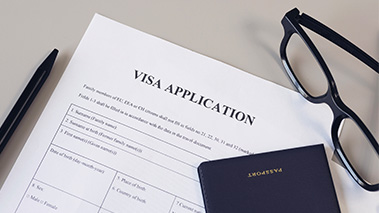
For over 30 years, The Fogle Law Firm has been at the forefront of U.S. immigration law, providing world-class legal solutions for individuals, families, investors, and businesses. As a boutique firm, we prioritize personalized strategies, practical solutions, and cost-effective results.
Atlanta Immigration Attorneys
30+ Years of Success in Complex Immigration Cases
Under the leadership of seasoned and accomplished Attorney H. Glenn Fogle, Jr., The Fogle Law Firm, LLC has had unparalleled success in fighting for the rights of our clients and immigrants to the United States. We are a premier boutique law firm that takes a human-driven approach, always keeping in mind our clients' personal struggles and aspirations.
Since 1991, we have supported tens of thousands, handling high-stakes immigration matters like asylum, deportation defense, employment-based immigration, family immigration, appeals, immigration litigation, and much more. Our diverse clientele has included families wanting to relocate to the US to be with family members and start new lives; multinational businesses, entrepreneurs, and investors looking to seize opportunities; and unaccompanied minors, refugees, asylum seekers, and crime victims needing protection within our country's borders.
Our team of Atlanta immigration attorneys are some of the most renowned and widely trusted in the Southeastern US. If you are searching for someone to help you or a loved one navigate intricate immigration processes and overcome complex legal challenges, make The Fogle Law Firm, LLC your first call. We offer clients multilingual support in English, Spanish, and French.
Request a case evaluation at our firm by calling (888) 970-8505 or contacting us online. We proudly represent people not only in Georgia, North Carolina, and California. We are also available to travel to other areas of the United States where you need our representation.
Comprehensive Immigration Services
Strategic Solutions for Individuals, Families, and Businesses

Meet Our Team
A Diverse, Multilingual Team with A Passion for Immigration Law

Immigration Lawyers Serving Individuals, Families, & Businesses
America's immigration laws can impact you regardless of whether you are within the country's borders and no matter the state you call home. That is why we extend our affordable services to people and organizations across the US and around the world. We frequently assist clients virtually, making it possible for them to receive timely counsel, efficient document review and preparation, and other services wherever they need them. Additionally, we continuously monitor evolutions in federal and state immigration law and adapt our approaches accordingly.


Why Clients Trust The Fogle Law Firm
We combine decades of experience with personalized service, creative legal solutions, and a deep commitment to justice to achieve the best possible outcomes.
-
Proven Track Record in Litigation
We have taken immigration cases to the U.S. Courts of Appeal and even helped create new case law, setting legal precedents that benefit immigrants nationwide.
-
Integrity, Honesty & Passion
We are committed to ethical representation, innovative legal thinking, and fighting passionately for our clients’ immigration rights.
-
Decades of Immigration Experience
With over 30 years of experience, The Fogle Law Firm has successfully guided clients through every stage of the immigration process, from strategic planning to completion.
-
Full-Service Immigration Solutions
Whether you’re an individual, a family, an investor, or a business, we handle everything from simple petitions to complex litigation before the highest courts.
-
Boutique Firm with a Human Touch
Unlike large firms, we provide personalized service and creative legal strategies tailored to each client’s unique immigration goals.
-
Diverse & Multilingual Team
Our attorneys and staff come from around the world and are fluent in English, French, Spanish, Korean, Portuguese, and more, ensuring clear communication with our diverse clientele.

The Fogle Law Firm in the News
Making Headlines in Immigration Law
-
 Ishimwe v. Barr, 16-7300Glenn Fogle presenting the wining argument before the Ninth Circuit Court of Appeals.
Ishimwe v. Barr, 16-7300Glenn Fogle presenting the wining argument before the Ninth Circuit Court of Appeals.
-
 Political Appointments to the Board of Immigration Appeals
Political Appointments to the Board of Immigration AppealsGlenn Fogle interviewed in Mother Jones.
-
 The Trump Administration Asylum Policy
The Trump Administration Asylum PolicyGlenn Fogle on 11 Alive News in Atlanta.

Success Stories from Our Clients
Hear from Those Who Have Trusted Us with Their Immigration Journey
Our clients share how The Fogle Law Firm helped them achieve their immigration goals with personalized, effective strategies.
-
"I would highly recommend this firm to everyone."
They were patient, kept me informed and were very detailed in their work. This firm is very reputable. The attorneys are quite knowledgeable and well-respected in the industry. Their work and reputation really helps with my case.
- E.O. -
"Truly a remarkable firm."All I can say is thank you Glenn, and your most gracious staff at the Fogle Law Firm for all you've done for me and my family.- M.T.
-
"Highly recommend."With a commendable success rate and a delightful experience with the law firm, we would highly recommend Glenn and his team for all immigration related requirements.- P.C.
An Unparalleled Track Record of Success
We have not merely practiced immigration law since 1991. For over three decades, we have achieved many successes, with Attorney Fogle leading the charge. He has won over 15 high-profile cases in the US Circuit Courts of Appeals and even brought one case to the Supreme Court.
Beyond appeals and litigation, we have helped a great number of people and businesses obtain all kinds of family and employment visas, fought to secure asylum and other protections for those facing removal, and guided people on their paths to lawful permanent residency and citizenship.
While we are proud of our track record, we are mostly proud of the lives we have bettered and relationships we have built. The matters we take on concern so much more than the law. Our cases mean everything for our clients' futures, livelihoods, and, at times, dignity and safety. We strive to provide services that reflect this gravity.
To see what you might expect as a client of The Fogle Law Firm, LLC, visit our Testimonials page to read about the experiences of individuals and organizations we supported in situations just like yours.
To offer you further confidence, Attorney Fogle has a 10.0 superb Avvo rating, and many of our other brilliant, respected attorneys have earned high Avvo ratings and other notable accolades. You can read about them by visiting our Meet the Team page and checking out our lawyers' bio pages.
Every Immigrant Has a Story. We Want to Hear Yours.
Providing premier immigration law services means tailoring strategies and approaches to our clients' specific situations, urgent needs, and long-term goals. We would be unable to do this if we did not listen to our clients, beginning with their stories behind reaching out to us.
If you are considering turning to The Fogle Law Firm, LLC, you likely have a story to tell, and we want to hear it. We welcome the opportunity to serve those with immigration cases of all complexity. Regardless of the challenges you face, you can count on us to deliver the personalized support, direction, and advocacy you deserve.
Call (888) 970-8505 or contact us online to request a case evaluation. While we’re based in Georgia, North Carolina, and California, we are also available to travel nationwide to represent you wherever you need us.
Where to Find Us
We Can Represent You in All 50 States, Even if You're Abroad
Our firm serves clients nationwide and globally, ensuring you receive top-tier immigration representation no matter your location.

Partnering with International Organizations
We have worked with and sponsored various international organizations and events with foreign consulates as we seek to remain engaged and active in the international and immigrant community in cities where we have offices.
-
 French-American Chamber of Commerce
French-American Chamber of CommerceWe are proud members and sponsors of the Atlanta-Southeast Chapter of the FACC
-
 Consulate of Mexico
Consulate of MexicoWe are proud to support the Mexican Consulate in Atlanta in their cultural and community outreach
-
 French District
French DistrictWe are proud to be part of the French District Network
-
 Colombian Consulate of Atlanta
Colombian Consulate of AtlantaWe regularly sponsor cultural events at the Colombian Consulate
Immigration Insights & Legal Updates
Visit Our Blog
Want all the latest news or updates? Browse through our blog to read our most recent posts and featured articles.















.2504211619228.png)













